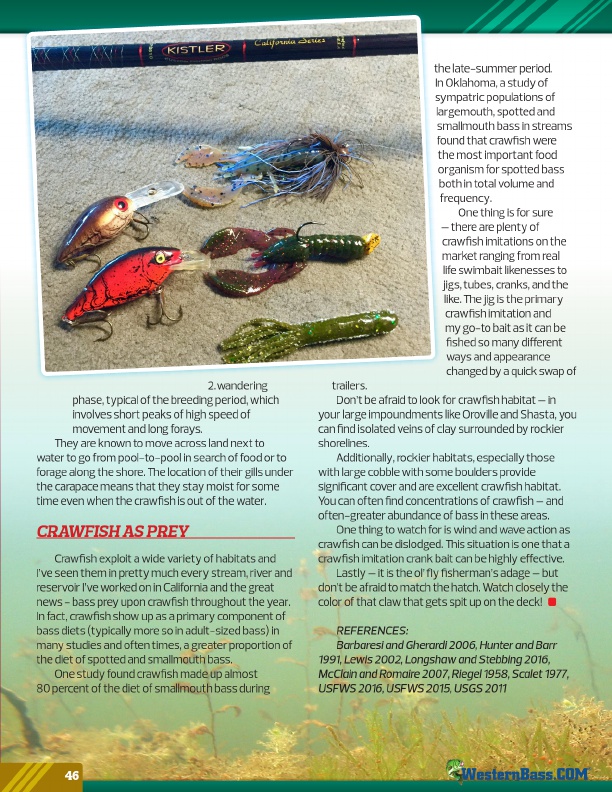
2.wandering
phase, typical of the breeding period, which
involves short peaks of high speed of
movement and long forays.
They are known to move across land next to water to go from pool-to-pool in search of food or to forage along the shore. The location of their gills under the carapace means that they stay moist for some time even when the crawfish is out of the water.
CRAWFISH AS PREY
Crawfish exploit a wide variety of habitats and I’ve seen them in pretty much every stream, river and reservoir I’ve worked on in California and the great news - bass prey upon crawfish throughout the year. In fact, crawfish show up as a primary component of bass diets (typically more so in adult-sized bass) in many studies and often times, a greater proportion of the diet of spotted and smallmouth bass.
One study found crawfish made up almost 80 percent of the diet of smallmouth bass during
the late-summer period.
In Oklahoma, a study of
sympatric populations of
largemouth, spotted and
smallmouth bass in streams
found that crawfish were
the most important food
organism for spotted bass
both in total volume and
frequency.
One thing is for sure
– there are plenty of
crawfish imitations on the
market ranging from real
life swimbait likenesses to
jigs, tubes, cranks, and the
like. The jig is the primary
crawfish imitation and
my go-to bait as it can be
fished so many different
ways and appearance
changed by a quick swap of
trailers.
Don’t be afraid to look for crawfish habitat – in your large impoundments like Oroville and Shasta, you can find isolated veins of clay surrounded by rockier shorelines.
Additionally, rockier habitats, especially those with large cobble with some boulders provide significant cover and are excellent crawfish habitat. You can often find concentrations of crawfish – and often-greater abundance of bass in these areas.
One thing to watch for is wind and wave action as crawfish can be dislodged. This situation is one that a crawfish imitation crank bait can be highly effective.
Lastly – it is the ol’ fly fisherman’s adage – but don’t be afraid to match the hatch. Watch closely the color of that claw that gets spit up on the deck!
REFERENCES:
Barbaresi and Gherardi 2006, Hunter and Barr 1991, Lewis 2002, Longshaw and Stebbing 2016, McClain and Romaire 2007, Riegel 1958, Scalet 1977, USFWS 2016, USFWS 2015, USGS 2011
46 ®